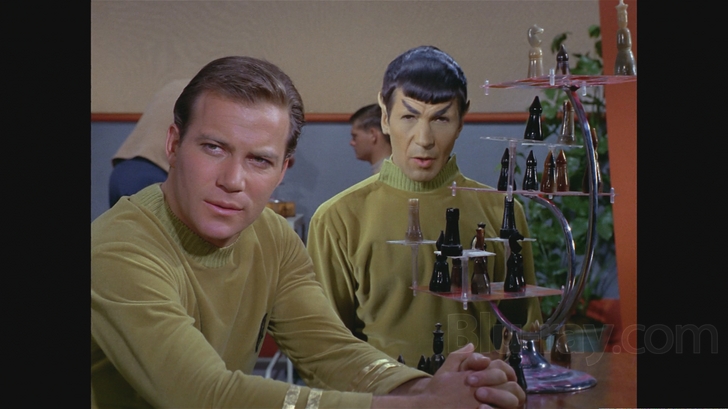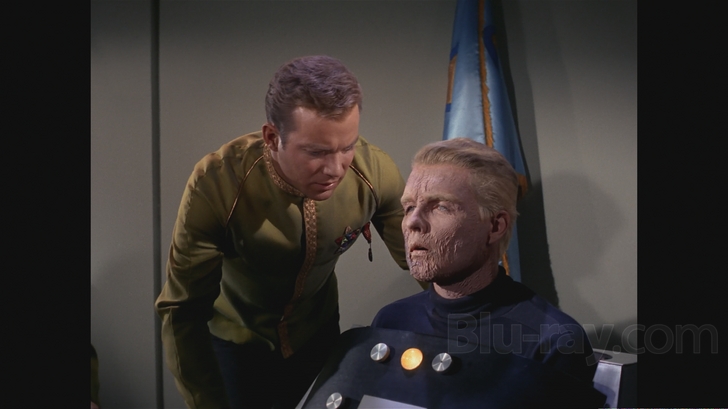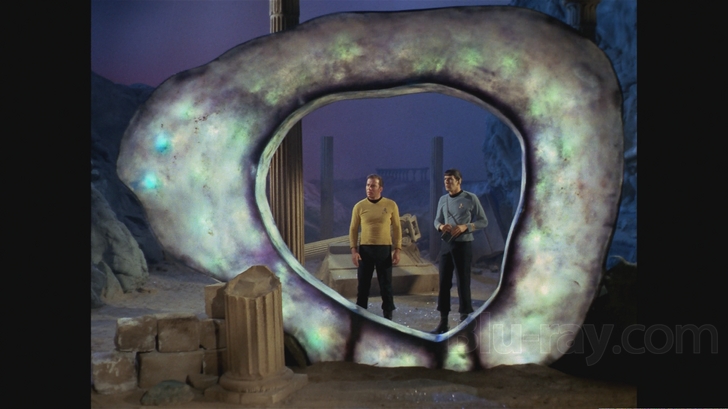Star Trek: The Original Series: Season 1 Blu-ray Movie
HomeStar Trek: The Original Series: Season 1 Blu-ray Movie 
Paramount Pictures | 1966-1967 | 1465 min | Not rated | Apr 28, 2009
Movie rating
8.6 | / 10 |
Blu-ray rating
| Users | 4.6 | |
| Reviewer | 5.0 | |
| Overall | 4.6 |
Overview
Star Trek: The Original Series: Season 1 (1966-1967)
Space. The Final Frontier. The U.S.S. Enterprise embarks on a five year mission to explore the galaxy. The Enterprise is under the command of Captain James T. Kirk. The First Officer is Mr. Spock, from the planet Vulcan. The Chief Medical Officer is Dr. Leonard \'Bones\' McCoy. With a determined crew, the Enterprise encounters Klingons, Romulans, time paradoxes, tribbles and genetic supermen lead by Khan Noonian Singh. Their mission is to explore strange new worlds, to seek new life and new civilizations, to boldly go where no man has gone before.
Starring: William Shatner, Leonard Nimoy, DeForest Kelley, Nichelle Nichols, James DoohanDirector: Vincent McEveety, Marc Daniels, Joseph Pevney, Ralph Senensky, Jud Taylor
| Sci-Fi | Uncertain |
| Adventure | Uncertain |
| Action | Uncertain |
Specifications
Video
Video codec: VC-1
Video resolution: 1080p
Aspect ratio: 1.33:1
Original aspect ratio: 1.33:1
Audio
English: DTS-HD Master Audio 7.1 (48kHz, 24-bit)
English: Dolby Digital 2.0 Mono (192 kbps)
French: Dolby Digital 2.0 Mono (192 kbps)
Spanish: Dolby Digital 2.0 Mono (192 kbps)
Subtitles
English SDH, French, Portuguese, Spanish
Discs
50GB Blu-ray Disc
Seven-disc set (7 BDs)
BD-Live
Packaging
Slipcover in original pressing
Playback
Region free
Review
Rating summary
| Movie | 5.0 | |
| Video | 4.5 | |
| Audio | 4.0 | |
| Extras | 4.0 | |
| Overall | 5.0 |
Star Trek: The Original Series: Season 1 Blu-ray Movie Review
Beam this title into your collection!
Reviewed by Martin Liebman April 29, 2009Space. The final frontier. These are the voyages of the starship 'Enterprise.'
Reviewer's log, stardate 042009.29.
The highly-desired 'Star Trek' Season One package has finally docked on Blu-ray with stellar
results. A seven-disc set,
complete with 1080p high definition video, DTS-HD MA 7.1 lossless surround sound, plenty of
worthwhile bonus features, and the inclusion of both the original
and
digitally-enhanced versions of the show, 'Star Trek' Season One will prove hard-to-beat for status
as Blu-ray television release of the year, and may proudly throw its hat into the ring as a
competitor for best
overall Blu-ray release of 2009. Now positioned as arguably Blu-ray's strongest supporter in both
quality of discs and number of titles released, Paramount has once again exceeded expectations
with this remarkable set, one that is sure to please both 'Star Trek' and Blu-ray fans alike.

Not chess, Mr. Spock...poker!
Though the "Star Trek" brand has recently lost some of its luster with lukewarm-to-poor critical and fan reception of the last two "The Next Generation" films and the prequel television show "Enterprise," the franchise -- and its original cast that saw their career-defining and life-changing debuts in 1966's "Star Trek" in particular -- remains a worldwide phenomenon. The names Kirk, Spock, and McCoy form, arguably, the most widely-known, loved, and respected trio of television characters of all time. Phrases such as "to boldly go where no man has gone before," "live long and prosper," and "beam me up, Scotty" are instantly recognizable and understood in context the world over. The U.S.S. Enterprise immediately brings to mind a starship with a large saucer section, a deflector dish, and a warp drive rather than an aircraft carrier or modern-era space shuttle. "Star Trek" also proved to be groundbreaking television in a number of areas, foreseeing the widespread use of small, handheld, and wireless communication devices, for example. Most importantly, however, the show looked forward to a future free of prejudice, instead defined by compassion and understanding, but not one without raw human emotion, a trait recognized by series creator Gene Roddenberry and removed from one character, Leonard Nimoy's half-human and half-Vulcan Mr. Spock, a being that is influenced by his human half but dominated by his logical and tightly-controlled Vulcan half. As such, Roddenberry understands that emotion drives mankind, but through both the half-human Spock and the social progression of man as seen in the show, he acknowledges the dichotomy inside every man that at once leads him to follow his instincts but also demands logic and intelligence as crucial problem-solving skills. The Enterprise bridge crew is made up of a hodgepodge of humans of varied backgrounds and ethnicities (and one alien), and the inclusion of an African-American woman as a lead character was, at the time, both novel and risky, actress Nichelle Nichols and her character both becoming heroes to millions practically overnight. "Star Trek" is representative of so much and is equally as meaningful to so many, and for countless different reasons -- the show's broad range of characters, social themes, quality of storytelling, importance to and influence on the Science Fiction genre, and, of course, action and adventure -- it is now remembered as arguably the most important and influential television program of all time.
Like "The Next Generation" but unlike "Deep Space Nine," "Star Trek" does not feature a continuous story arc but rather tells a new story with each episode, one generally not influencing the events of the next. What the first season does, however, is develop its characters quickly and efficiently, almost from the first episode onward establishing major character traits and personalities that would come to define them through two additional seasons, a short-lived animated series, and six motion pictures. From the get-go, Captain Kirk is the stoic, intelligent, but rough-around-the-edges leader who isn't afraid of a fight but will also take the high road when given the opportunity. Mr. Spock is the alien of the bunch, both literally and figuratively, who expresses no emotions and is the foil to Kirk's sometimes overly-aggressive and emotionally-driven nature. Spock is also both highly logical and highly intelligent, making him the perfect First Officer of the Enterprise. Dr. McCoy falls somewhere in the middle of the three, his personality dictated by years of medical training and a infectious sense of humor, his character always at odds with the "green blooded Vulcan." Together, the three form the foundation of "Star Trek;" despite their differing thought processes and approaches to crisis situations, they constantly learn from one another and, deep down, understand and embrace the others' sometimes strikingly odd ways. It is their many differences that draw them closer together, the three making for something akin to a close-knit family. The first season of "Star Trek" also hints at what is to come, featuring the debut of Ricardo Montalbán's Khan Noonien Singh who would later return in the finest Star Trek movie to date, The Wrath of Khan; McCoy expresses concern that he may begin talking to himself, a fear he later repeats at the beginning of Star Trek V: The Final Frontier; and the show makes a reference to Majel Barrett (Gene Roddenberry's wife) as a "computer" in "The Menagerie" (and "The Cage"), a role she would later play in several incarnations of "Trek" on both the large and small screens, providing the voice for the ship's computer system.
Although the first season of "Star Trek" takes its time in fleshing out all the small details, there is no shortage of classic episodes to behold. With nearly half the season standing out from the pack -- be it through the introduction of classic characters (Harcourt Fenton Mudd in "Mudd's Women," Khan Noonien Singh in "Space Seed," or the Gorn in "Arena") or outstanding story lines ("The Corbomite Maneuver," "The Menagerie," and "The City on the Edge of Forever") -- the first season, unlike that of any of the "Star Trek" series to follow, consistently amazes and defies all television logic, the episodes and the characters therein well-developed and the actors capturing the spirit of their make-believe counterparts from the get-go, in spite of the fact that something always seems different one episode to another. On-going characters often wear a different color uniform one week to the next; various episodes see the absence of one or more of the characters that would come to make-up the ship's bridge crew (particularly Uhura, Scotty, and McCoy; Pavel Chekov doesn't appear in "Star Trek" until Season Two, "Catspaw"); and one episode, "Where No Man Has Gone Before," the series' "second pilot" (though the third episode aired) sees the use of the letter "R" as representative of Kirk's middle initial, rather than the "T" (for "Tiberius") that would later become synonymous with the character.
Season One highlight episodes include, but are not limited to:
Episode One, "The Man Trap"
Stardate 1513.1. With Spock (Leonard Nimoy) temporarily in command of the Enterprise, Doctor McCoy (DeForest Kelley), Captain Kirk (William Shatner), and a crewman beam down to a planet inhabited by only two people -- archeologists Nancy and Robert Crater -- to check on their well-being and provide their mandated annual medical check-up. McCoy's former relationship with Nancy provides insight into a strange occurrence, in that Nancy appears as a different woman to each member of the crew who sees her. Although Mr. Crater insists that he and Nancy are fine, the Enterprise crew is forced to remain when a crewman dies on the planet surface, the salt from his body having disappeared. As members of the crew continue to die, it becomes obvious that Nancy may not be who she claims. Can McCoy set his personal feelings aside before more red-shirted (and blue and gold as well) crew succumb to mysterious deaths?
Episode Three, "Where No Man Has Gone Before"
Stardate 1312.4. The Enterprise beams a small object on board, a disaster recorder from the S.S. Valiant. The recorder recounts the tale of the Valiant's crew learning as much as possible about -- and becoming increasingly frenetic in their pursuit of knowledge of -- Extra Sensory Perception, or ESP, prior to her destruction. The Enterprise passes through a barrier that confuses the ship's equipment, and a crewman and longtime friend of Kirk, Gary Mitchell, is seemingly wounded during the incident. His eyes now silver in color, he gains the ability to read at an alarming rate and his powers of ESP begin to increase geometrically, soon becoming a dangerous threat to the ship. The Enterprise approaches Delta Vega, a barren planet that may be suitable for marooning Mitchell before he takes complete control of the ship with only his newfound extraordinary powers.
Episode Five, "The Enemy Within"
Stardate 1672.1. A transporter malfunction duplicates Captain Kirk, the copy an aggressive, angry, and dangerous man with absolute control of the ship and the harm of others on his mind. The real Captain Kirk slowly but surely loses control of his mental acumen, failing to make the right decisions and maintain his stature as ship's captain. Meanwhile, a quartet of crewmen, including Mr. Sulu, remain stranded on the planet below, its temperatures rapidly plummeting, while Scotty attempts to solve the transporter problem.
Episode Six, "Mudd's Women"
Stardate 1329.1. The Enterprise is in pursuit of a small vessel. The crew beams aboard a man calling himself Leo Walsh, a flamboyant individual who seems half pirate and half cowboy based on his dress, mannerisms, and career. Following him is a trio of beautiful women that spellbind the transporter crew -- McCoy, Spock, and Scotty -- and subsequently Kirk and the entire ship. Walsh calls the ladies his "cargo," and he is soon confined to quarters and set to face trial for his past crimes. It is learned that Walsh -- who is actually named Harcourt Fenton Mudd -- collects women to become brides for lonely settlers. Meanwhile, the Enterprise has sustained damage during the rescue of Mudd, and the lone remaining Lithium Crystal -- that which fuels and powers the ship -- has formed a hairline fracture. As the ship limps towards Rigel XII for replacements, Mudd develops a scheme to hide the true identity of his cargo and escape his sentence.
Episode Eight, "Miri"
Stardate 2713.5. The Enterprise encounters a duplicate copy of Earth, circa 1960, with the same continental and ocean formations, as well as the technology of the time. The planet has been in a state of decay for several centuries. On the planet's surface, Dr. McCoy is attacked by an adult humanoid creature that is found to have the mind of a child. The individual soon dies form an accelerated metabolism while showing signs of a disease covering its skin. The landing party soon discovers another person, this one a young girl named Miri, who tells the crew that all the "grups" (grown ups) on the planet grow sickly and die. The landing party begins to show signs of the disease that kills the grups, save for Mr. Spock, and must work fast to come up with a cure and uncover the mysteries of the world around them.
Episode Ten, "The Corbomite Maneuver"
Stardate 1512.2. The Enterprise is charting deep space when she encounters a cube-shaped object. The crew surmises that the cube is neither a crewed vessel nor a living being, though it manages to match the ship's every move and block its path. As a last resort, Captain Kirk orders its destruction with a blast from the Enterprise's phaser banks. Soon thereafter, another object, this one spherical in shape and countless times larger than the cube, hurtles towards the vessel. The sphere's captain vows to destroy the Enterprise in 10 minutes, believing her intentions to be hostile. Refusing both reason and extensive dialogue, Captain Kirk hedges his bets on a "Next Generation" favorite, poker, as a last-ditch effort to survive.
Episodes Eleven and Twelve, "The Menagerie"
Stardate 3012.4. The Enterprise receives a signal to divert to Starbase 11, though no record of the transmission may be found in Starfleet databases. On the planet, it is revealed that the ship's and Mr. Spock's former Captain, Christopher Pike (Jeffrey Hunter), has sustained massive injuries and is now confined to a futuristic wheelchair and unable to speak, his only means of communication a blinking light, one blink "yes," two blinks "no." Pike refuses to meet with the Enterprise away team, but meets with Mr. Spock in private. The Vulcan reveals that he has deceived his current Captain, Kirk, and violated Starfleet protocol in order to carry out a secret mission. Spock returns to the ship, leaving an unawares Kirk behind. Spock places himself in temporary command of the Enterprise, programs the ship's computer to travel to a precise -- and forbidden -- destination, the planet Talos IV, and reveals the presence of a special guest aboard the Enterprise, Captain Pike. Desperate to regain control of his ship and verify the treachery committed by his close friend and First Officer, Kirk pursues the Enterprise in an underpowered and low-on-fuel shuttlecraft. With his shuttle past the point of no return, Spock engages the ship's tractor beam and brings Kirk aboard -- and surrenders to Dr. McCoy. At his trial, the seemingly illogical Vulcan presents video evidence of a mission he and Captain Pike served together on 13 years earlier (as seen in the episode "The Cage"). A three-member tribunal, which includes Captains Pike and Kirk, must choose between upholding Starfleet regulations and sentencing their friend to death or accepting both the evidence and the logic of a seemingly illogical yet expertly-conceived deception that has jeopardized the career of one of Starfleet's best officers.
Episode 15, "Shore Leave"
Stardate 3025.3. In desperate need of time away from the daily grind of life aboard a starship, Captain Kirk orders the survey of an Earth-like planet that may be suitable for shore leave. All is well and the first wave of vacationers is set to beam down when Dr. McCoy witnesses an unexplainable oddity: a several-feet-tall rabbit wearing a vest and pocket watch and commenting on his tardiness, being chased by a young blonde girl in a blue dress, the scene straight out of Alice in Wonderland. Other members of the away team soon encounter a series of seemingly off-the-wall characters and situations, each experiencing, in life, precisely that which they think. When the experiences turn from curiosity to a deadly-serious affair, the crew must discover the planet's secret and salvage their much-needed shore leave.
Episode 18, "Arena"
Stardate 3045.6. The Enterprise responds to a distress signal from an Earth outpost, and the away team finds it destroyed with practically no survivors. Kirk, Spock, and McCoy detect non-human living creatures in close proximity to the ruins and come under heavy fire, while the Enterprise simultaneously comes under attack while in orbit. When the enemy disengages both on the surfaces and in space, Kirk and Spock attempt to discern the reasoning behind the attack, and come to one logical deduction: invasion. The Enterprise pursues the enemy vessel, hoping to catch it before it reaches home. When the pursued ship comes to a standstill, Kirk believes he's won the day, until the Enterprise, too, comes to a complete stop, the crew unable to bring engines or weapons online. Both vessels are held in place by the Metrons, a species that doesn't take kindly to hostile aliens entering their space. Kirk and the captain of the enemy vessel -- a lizard-like creature called a Gorn -- are whisked away to a planet, alone, to fight one another to the death, the victor allowed to live, the vanquished and his ship to be destroyed.
Episode 22, "Space Seed"
Stardate 3141.9. The Enterprise encounters an ancient Earth vessel, circa 1990, and Dr. McCoy detects faint heartbeats on board. The ship is the S.S. Botany Bay, housing dozens of survivors from Earth's third World War. Ship's historian McGivers finds herself infatuated with the leader of the centuries-old and hibernating crew of the Botany Bay, a 20th Century tyrant named Khan Noonien Singh (Ricardo Montalbán). During and after his recovery from the long sleep, Khan shows impressive and seemingly superhuman physical, recuperative, and mental powers. When he regains full physical and mental capacities after nearly two centuries of slumber, he hatches a plan to take control of the Enterprise -- with McGivers' help.
Episode 28, "The City on the Edge of Forever"
Stardate 3134.0. The Enterprise passes through ripples in time, being influenced by something -- or someone -- on a planet below. In the commotion, McCoy accidentally injects himself with a powerful drug, instantly driving him mad. He beams himself down to the planet surface, straight into the heart of the disturbances. The rescue party discovers an ancient artifact, the self-titled "Guardian of Forever," that is revealed as the source of the temporal disturbances. McCoy jumps through the Guardian and back in time, and his presence in the past instantly erases the future as the Enterprise crew knows it. Spock and Kirk travel back as well, arriving in depression-era America, in an attempt to prevent whatever damage McCoy will cause to the timeline. There, they are met by an imaginative and insightful woman named Edith Keeler (Joan Collins), a social worker with whom Kirk falls in love -- and on whose fate the future of the universe rests.
Star Trek: The Original Series: Season 1 Blu-ray Movie, Video Quality 

"Star Trek" beams onto Blu-ray with a most impressive 1080p, 1.33:1-framed transfer. This aspect ratio retains the show's original 4:3 television presentation, resulting here in vertical black bars on either side of the image when replayed on a 1.78:1-sized television set. The first thing that many viewers may note is the presence of grain in most every shot, occasionally spiking in intensity but practically always visible at normal viewing distances. The film elements have been cleaned up nicely, though, with only a few speckles to be seen here and there. Colors are marvelous and strong in each episode; the red, blue, and gold crew shirt uniforms are strong and distinctly reproduced, each shade bold and true to the original intent. Likewise, the various doodads found scattered about the ship -- particularly the bridge -- and the many locations visited throughout the season, from a replica of 1960s Earth to the many barren planet surfaces populated by Styrofoam rocks and matte paintings, all offer standout color reproduction. Detail, too, is remarkably high; viewers will see plenty of sweat glistening on character faces, the stitching and fabric on the clothing and Starfleet patches, and the small details that make up communicators, tricorders, and phasers. Many planet surfaces look appropriately phony and crude, but nevertheless effective considering both the age and feel of the show, under the scrutiny of 1080p high definition. Likewise, the Enterprise's bridge looks better than ever, with even the bad paint jobs on the ship's conn standing out as plainly visible. Flesh tones and black levels are both suitably good. A few shots take on a slightly soft and fuzzy appearance, but the vast majority of each episode should positively thrill longtime fans and newcomers alike. Save for the outdated sets and costumes, "Star Trek" looks almost brand new on Blu-ray, this video presentation a revelation to be sure.
Star Trek: The Original Series: Season 1 Blu-ray Movie, Audio Quality 

"Star Trek" warps onto Blu-ray with a wholly satisfying selection of audio presentations, including a DTS-HD MA 7.1 lossless option. Music and sound effects are heard subtly but distinctly across the front and occasionally in the rears, though much of the track is focused straight up the middle. During the show's famed opening title sequence, however, sound swoops nicely but not aggressively across the soundstage. The effect is much more pronounced when viewed during the remastered version of any given episode; the path of the Enterprise is practically felt as it moves throughout the listening area, featuring much more volume and presence than that accompanying the original title sequence. On board the Enterprise, the hums of the various gizmos and gadgets, from Spock's bridge science station to the beeps, hums, and thuds of the transporter room, are heard clearly and distinctly, even under dialogue and music. Alarm claxons reverberate throughout the soundstage on occasion, signaling imminent danger to the ship and her crew while also making for some of the more interesting sonic material the show has to offer. Bass is never noticeably powerful, but rather sufficient, particularly as heard accompanying a few explosions during "Where No Man Has Gone Before." "Star Trek's" classic score as presented here sounds sharp and crisp, with excellent fidelity across the board. Most of the track remains focused in the front channels, the quartet of rear speakers coming into play occasionally for atmospherics and only a few discrete effects. Dialogue, the heart and soul of the show, is always heard distinctly and clearly. "Star Trek" may not make for a surround sound extravaganza, but it's never sounded better than it does on this Blu-ray release.
Star Trek: The Original Series: Season 1 Blu-ray Movie, Special Features and Extras 

This Blu-ray release of "Star Trek" should energize fans with its plethora of bonus features spread
across all seven discs in the set. The following is a disc-by-disc breakdown of features.
Disc One
Disc One begins with Starfleet Access for the episode "Where No Man Has Gone Before,"
a
feature that "grants you security clearance to explore Starfleet Command's Database." This
supplement features a diverse selection of "Trek" Producers, Writers, Historians, and Authors,
including Michael and Denise Okuda, appearing throughout the show in a picture-in-picture
window
discussing the story, props, characters, score, updated effects, and more. Also included is a
text-based
pop-up trivia track, often appearing simultaneously with the secondary video presentation. Next
up
is Spacelift: Transporting 'Trek' Into the 21st Century (1080i, 20:10), a fascinating look
at the restoration process used to clean up the video, re-record the score, and the
creation
of the updated visual effects. Also included on disc one is the trailer for the upcoming Star
Trek film (1080i, 2:08) and 480p previews for each episode appearing on disc one -- "The
Man Trap," "Charlie X," "Where No Man Has Gone Before," and "The Naked Time."
Disc Two
Disc two features only 480p previews for the five episodes included on the disc -- "The Enemy
Within," "Mudd's Women," "What Are Little Girls Made Of?," "Miri," and "Dagger of the Mind."
Disc Three
Disc three once again features Starfleet Access, this time accompanying "The Menagerie,
Part 1" and "The Menagerie, Part 2." Reflections on Spock (480p, 12:03) is a piece
featuring Leonard Nimoy recalling his character and his career, discussing, among other things,
his book, I Am Not Spock. Finally, 480p previews for "The Corbomite Maneuver," "The
Menagerie, Part 1," "The Menagerie, Part 2," and The Conscience of the King" round out the third
disc.
Disc Four
Disc four once again features Starfleet Access, this time accompanying "The Balance of
Terror." Also included is Life Beyond 'Trek:' William Shatner (480p, 10:18), a short extra
featuring Shatner discussing his love of horses. Once again, the disc is concluded by a quartet of
480p previews for "Balance of Terror," "Shore Leave," "The Galileo Seven," and "The Squire of
Gothos."
Disc Five
Disc five contains a pair of featurettes. To Boldly Go...Season One (480p, 18:52)
features "Trek" cast and crew, including William Shatner and Leonard Nimoy, recounting briefly
the history of the first season. The Birth of a Timeless Legacy (480p, 24:07) is a solid
piece that looks at how "Star Trek" came to be, with particular attention paid to the show's dual
pilot episodes, "The Cage" and "Where No Man Has Gone Before." Finally, 480p previews for
"Arena," "Tomorrow is Yesterday," "Court Martial," and "The Return of the Archons" conclude
this disc's extra materials section.
Disc Six
Disc six sees the return of Starfleet Access, this time accompanying the episode "Space
Seed." Sci-Fi Visionaries (480p, 16:30) looks at what makes for good Science Fiction --
and why "Star Trek" works so well in the genre, with special attention paid to several episodes.
Interactive Enterprise Inspection (1080p) takes viewers inside a shuttlecraft and outside
the Enterprise for a formal and informative tour of the vessel. As usual, concluding the
supplements on this disc are 480p previews for "Space Seed," "A Taste of Armageddon," "This
Side of Paradise," and "The Devil in the Dark."
Disc Seven
Disc Seven also features Starfleet Command, this time attached to "Errand of Mercy."
Billy Blackburn's Treasure Chest: Rare Home Movies and Special Memories (1080i,
13:23) features the actor recounting his small roles on "Star Trek" and sharing his experiences
on the sets of many of the classic episodes, all intercut with behind-the-scenes footage. Kiss
'N' Tell: Romance in the 23rd Century (480p, 8:24) looks at the many lovely
ladies of "Star Trek" and the romances between characters. Also included on disc seven are 480p
previews for "Errand of Mercy," "The Alternative Factor," "The City on the Edge of Forever," and
"Operation -- Annihilate!" Rounding out this final disc are Enhanced Visual Effects Credits and
BD-Live (Blu-ray profile 2.0) functionality.
Star Trek: The Original Series: Season 1 Blu-ray Movie, Overall Score and Recommendation 

For as dated -- and sometimes comically so -- as it may now seem, "Star Trek" represents groundbreaking television for a number for reasons. From spawning eleven feature films and 26 seasons worth of spinoffs to being one of the first programs to cast an African-American woman in a lead role and assembling a true multi-national cast, no other television show has had such an impact on entertainment, culture, and philosophy as "Star Trek." Although many of the show's sets, hairdos, costumes, gadgets, and gizmos meant to represent progress hundreds of years from now have been far surpassed in the 43 years since its debut on September 8, 1966, the show remains crucial viewing for its stature as the epitome of Science Fiction, tackling the issues of its day, many of which remain relevant today, in the guise of sometimes easygoing, sometimes exciting, and sometimes through-provoking entertainment. Although now featuring the option of viewing the episodes with updated special effects, the roughness, charm, and simplicity of the original effects remain one of the show's trademarks, for "Star Trek" has been, and always shall be, about its characters, themes, and social commentary. Paramount delivers season one of "Star Trek" to Blu-ray with fantastic results. Featuring a breathtaking video transfer, a solid and clear lossless soundtrack, and plenty of extras, including the option of watching each episode with either its original or updated special effects, this is a set that boldly goes where no collection of "Star Trek" on home video has gone before, and it receives my highest recommendation.
Other editions
Star Trek: The Original Series: Other Seasons

Star Trek: The Original Series - Origins
1966-1986

Star Trek: The Original Series: Season 1
1966-1967

Star Trek: The Original Series - The Roddenberry Vault
1966-1969

Star Trek: The Original Series: Season 2
1967-1968

Star Trek: The Original Series: Season 2
1967-1968

Star Trek: The Original Series: Season 3
1968-1969

Star Trek: The Original Series: Season 3
1968-1969
Similar titles
Similar titles you might also like

Star Trek: Enterprise: The Complete Series
Budget Re-release
2001-2005

Star Trek: The Next Generation - The Complete Series
Budget Re-release
1987-1994

Star Trek VI: The Undiscovered Country 4K
1991

Star Trek IV: The Voyage Home 4K
1986

Star Trek: First Contact 4K
1996

Star Trek: Generations 4K
1994

Star Trek: Insurrection 4K
1998

Star Trek: Voyager
1995-2001

Lost in Space 4K
Limited Edition
1998

Star Trek V: The Final Frontier 4K
1989

Star Trek II: The Wrath of Khan 4K
1982

Star Trek III: The Search for Spock 4K
1984

Star Trek: Nemesis 4K
2002

Star Trek: The Motion Picture 4K
The Director's Edition | Remastered
1979

Battlestar Galactica
The Remastered Collection
1978-1980

Star Trek 4K
2009

Star Trek: Picard - The Complete Series
2020-2023

Battlestar Galactica: The Complete Series
2003-2009

Star Trek: The Animated Series
1973-1974

Planet of the Apes
1968